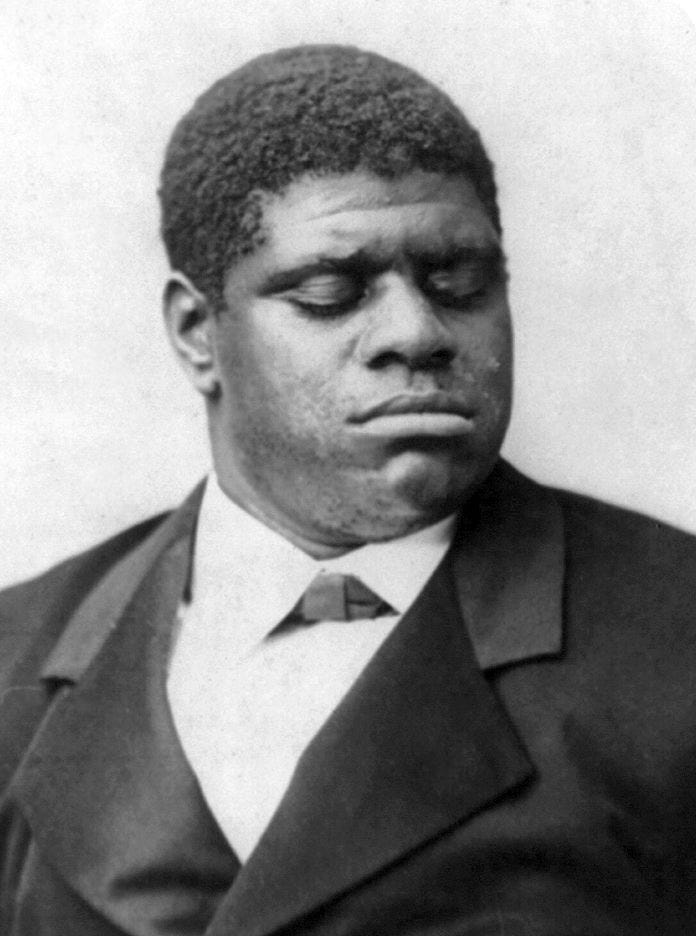Today In Black History: Blind Tom
19th-century musical prodigy whose earnings were stolen.
Issue #873 Today In Black History, Wednesday, June 18, 2025
Throughout June, “Black Music Month,” we are highlighting Black musicians.
Thomas "Blind Tom" Wiggins was born into slavery on May 25, 1849, in Columbus, Georgia. Blind from birth, Tom's early life was marked by both the systemic injustices of slavery and his astonishing musical abilities that defied the norms of his era. Recognized for his remarkable auditory memory and natural affinity for the piano, Wiggins became a prominent pianist and composer at a young age, earning acclaim and intrigue across the United States and Europe.
Because of his blindness, Tom could not work around the plantation, so he eventually started playing the piano in his owner’s house.
Tom was born on the plantation of Wiley Edward Jones in Columbus, Georgia. His musical genius was recognized early on, and he was taken under the wing of General James Neil Bethune, a lawyer and newspaper editor who also owned slaves. Bethune allowed Tom to perform publicly, and soon enough, Blind Tom became a sensation, performing for large audiences and even in front of President James Buchanan.
Wiggins began touring around the southern States as young as six years old, then from the age of eight, he was hired out to a concert promoter who sent him touring across the whole country, bringing in the promoter and Bethune sums of up to $100,000 a year (around $3.4 million today). It is thought that the Bethune family made around $750,000 ($25.4 million) from Wiggins’ talent in total.
Wiggins’ memory was excellent, and his repertoire was said to be over 7,000 songs long, with pieces ranging from hymns to classical music to popular music. He could listen to a piece and play it back almost immediately flawlessly.
Today, Blind Tom most likely would be considered both autistic and a savant.
The profits from Blind Tom's performances went to the Bethune family, as was typical when enslaved people's labor and talents were exploited for the benefit of their owners. Even after the Emancipation Proclamation and the end of the Civil War, Blind Tom remained under the control of the Bethune family. His legal status was complicated; despite the abolition of slavery, Tom's disability and dependence made it difficult for him to live independently.
After the death of General Bethune, a lengthy and contentious custody and financial battle ensued between Bethune's heirs and others who claimed a right to manage Tom and his earnings; these parties often had conflicting interests regarding Tom's welfare and the continuation of his career.
The courts had to decide who would be responsible for him, considering his inability to care for himself due to his disabilities. During these proceedings, he was shuffled between various guardians, each primarily motivated by the financial benefits derived from his performances.
Tom continued to perform into the late 19th and early 20th centuries, long after the events of the Civil War, but his story remained one of exploitation and legal struggle. He passed away in 1908, having lived a life marked by the complexities of race, talent, and exploitation.
Today In Black History
In 1862, Congress abolished slavery in U.S. territories.
In 1894, Uganda was declared a British protectorate.
In 1899, Black inventor W.H. Richardson patented the baby buggy.
In 1941, A. Philip Randolph refused a call from President Franklin Roosevelt to call off a scheduled March on Washington.
In 1941, the University of Rochester awarded Tuskegee scientist George Washington Carver an honorary Doctor of Science degree.
In 1942, a Harvard medical student was made an ensign in the U.S. Naval Reserve and became the first Black person to win a commission in the U.S. Navy.
In 1953, Egypt became a republic after the forced abdication of King Farouk I.
In 1963, three thousand Black students boycotted the Boston public schools as a protest against de facto segregation.
In 1964, when Black and white activists attempted to desegregate a motel swimming pool in St. Augustine, Florida, the owner poured acid in the pool, and the police arrested dozens, including 17 rabbis. The Ku Klux Klan firebombed the location.
In 1966, Samuel Nabrit became the first African American to serve on the Atomic Energy Commission.
In 1968, the U.S. Supreme Court banned racial discrimination in the sale and rental of housing.
If you like us, REALLY like us, please click the little heart “Like” button at the top of this post!
Buttons:
Heart: Like Bubble: Comment Arrow Up: Share Arrows Circle: Restack
If you like us, REALLY like us, please click the “Like” button at the top of this post!
Your “Likes” mean a LOT to us! We appreciate your support!
Buy Pam a cup of Colombian Coffee!
Engage with us and our posts on Substack Notes, where we publish new content almost daily.
Our June 2025 subscriber goals are 400 new free subscribers and 80 new paid subscribers! You can help us reach our goal!
We Are Speaking is a reader-supported publication. To receive new posts and support our work, consider becoming a free or paid subscriber.
Follow Pam on Bluesky, the best “X” alternative.
Follow Keith on Bluesky, the best “X alternative.
Independent Authors and Creative Professionals: Check out my valuable books and courses on Branding and Marketing just for you via Pam Speaks 2 You.









These stories are just heartbreaking and sickening. The way to stop cruelty is to hear these stories and understand them so they never happen again. Thank you for sharing this.
Human beings are the worst species in the world.